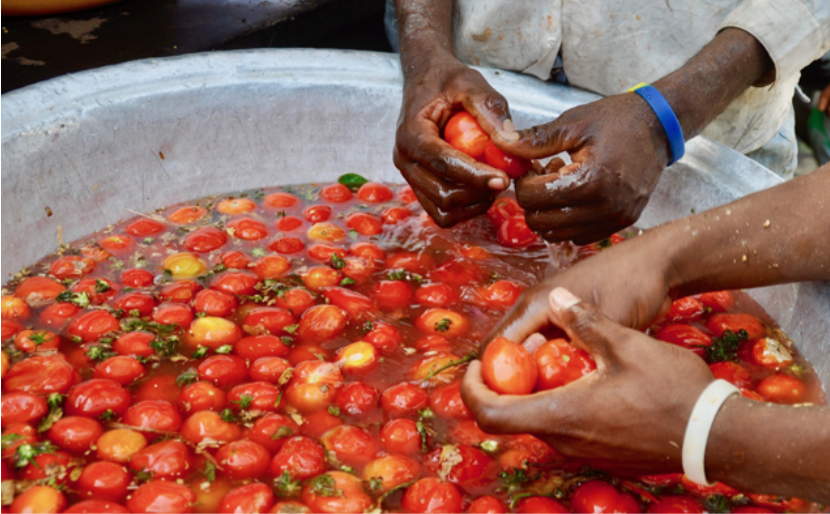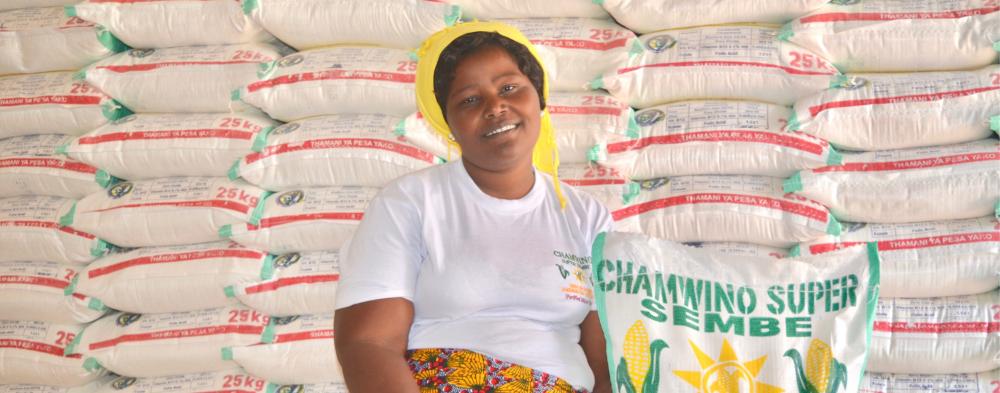
Graceco Foods Limited, a food processing and manufacturing company in Nigeria, was experiencing some shelf-life challenges when they noticed mold growing on their cupcakes within four weeks of production. Graceco quickly realized they needed to strengthen their industrial production knowledge to ensure that gaps in their technical knowledge were reduced significantly. To help bridge these gaps, PFS connected Graceco with General Mills QRO Engineer Linda Olson.
Adedayo Oshinnaiye, Graceco’s executive director of operations and supply chain, said working with PFS has been a game changer. “We’ve been able to identify the root cause of our shelf-life issues and have achieved better results since then,” he said. As the project nears completion, Graceco has already begun implementing volunteer recommendations such as using more advanced cleaning procedures and ensuring the cupcakes are stored at adequate temperatures throughout production. “The ability to share knowledge and learn from volunteers like Linda as well as the PFS program managers has been the best part about this program.”

For the past nine years, Java Foods has steadily built demand for its fortified instant noodles throughout Zambia. Though it’s a Zambian brand, the noodles themselves had always been produced in Asia under a co-pack agreement and imported. That is until 2020, when Java opened their new noodle production facility in Lusaka.
“It was time to transition to manufacturing locally. And to get it right the first time, we needed professional help to maintain or improve on the trusted brand we had created. This is where PFS fit in perfectly,” said Java Production Manager Stephen Opondo.
Bart Bender, Ardent’s technical services manager in Wisconsin, and Xin Liu, who has recently left Ardent Mills after five years, worked together on formulating the new noodles. They helped select the best flour for the product, coordinated the flour and noodle tests done in the U.S. lab and sent samples back to Zambia for their evaluation.
Though Bart has over 35 years of experience in the flour milling industry, he still learned something new during the project. “I didn’t know much about the quality and consistency parameters for the flour and oils available in that area (Southern Africa).” he said. “Those issues were greater than expected and needed to be realized in our evaluations.”
That deep knowledge and attention to detail really paid off for the Java team. “Their knowledge in food processing was unmatched. The kind of dedication they gave to the project was so encouraging and they were very free in sharing their knowledge,” said Stephen.
Java Foods Founder Monica Musonda agrees and says PFS support over the years has helped them to think big. “We want to see Java become one of the big food processors and consumer goods manufacturers in Southern Africa – focusing on producing food that is good for the community. We hope to add new foods to our portfolio and also export into the region,” she said.
And Bart may even have the opportunity to help Java in realizing that goal. “I loved watching the video of the Java team producing instant noodles on their production line. A job well done!” he said. “This was my first project with PFS and I will be looking for another to join.”

Kailey Bullock is a specialty grain merchant and has worked with three Partners in Food Solutions clients: Spice World in Kenya, Supa Seki and Sozi Integrity Trading, both located in Tanzania.
PFS: Tell us about yourself and your role at Ardent Mills.
KB: I developed a passion for agriculture at a young age by growing up in the ag industry in Texas. Now I reside in Colorado and enjoy spending time outdoors. At work you will find me purchasing numerous commodities as a specialty grain merchant for The Annex.
PFS: What is your main motivation for volunteering with PFS?
KB: To help feed the world.
PFS: Why did you choose to volunteer as a Client Lead?
KB: I volunteered on a few projects throughout the past couple of years and really enjoyed it. Being a Client Lead is a slightly different kind of opportunity with PFS.
PFS: What’s your favorite part of volunteering with PFS?
KB: Directly making a positive impact on clients in the food industry who want to make a difference in the world. Through PFS, clients receive guidance through challenges and solutions to better enhance their operation. PFS does a great job putting together a diverse group of volunteers to reach the clients goals for the project.
PFS: If someone is hesitant to volunteer with PFS, what would you say to them?
KB: Self growth revolves a lot around putting yourself out there and trying something new. It is very rewarding when helping someone in need by giving a little bit of your time and expertise. PFS creates a support system for both clients and volunteers by strategically putting teams together.

Sometimes it’s the simple questions that reveal the most important answers. That’s what Ardent Mills’ Bill Boyden discovered while working with Tomato Jos, a tomato processing company in Kangimi, Nigeria. The company was formed to process locally grown tomatoes - in season for only a short time - into paste so that the tomato harvest bounty can be preserved.
Tomato Jos was in the process of building a new warehouse to help expand their business and optimize the space for both raw materials and finished goods. At the same time, a staffing and process optimization project began for their expected growth. That is where Bill became involved. “I literally had no previous knowledge of tomato processing at all. So, Tomato Jos may have wondered why I was asking a lot of simple questions.” he said. “This project helped me to understand the dynamics of the supply chain – the seasonality of the farming activities, limited time from harvest to processing due to no storage, plant operations only scheduled for a few weeks based on their year-one business targeted sales – and the difficulty of creating an efficient staffing plan with all these considerations.”
It was these simple questions that helped lead them to a very customized three-phase staffing plan that would allow them to develop and upskill their staff at the same time that their business was shifting from raw materials to finished product production. “A staffing plan was developed which included several key benefits: team members from the adjacent farming operation could support raw material unloading and maintenance resource needs, inexperienced team members assigned to entry level roles would be provided with learning and development opportunities that would allow them to grow and expand their responsibilities for next phase of roles as the plant progressed. This changes provided a more optimal structure for plant supervision, engineering and laboratory functions,” said Bill.
Ironically, Tomato Jos noted that the real life value of appropriate staffing and systems is evident in how PFS itself works. “Our favorite thing about working with PFS has to be how committed the team is to getting us high-quality volunteers,” said Processing Manager Francis Bulus. “It’s evident in how, at virtually every point, the team communicates its volunteer recruitment plans, philosophy, and status to us, as well as how clearly they often map out our expectations and how these have to align with theirs.”
Tomato Jos management reports that recruitment is currently underway for the second stage of their operations, exactly in accordance with their elegant plan.
